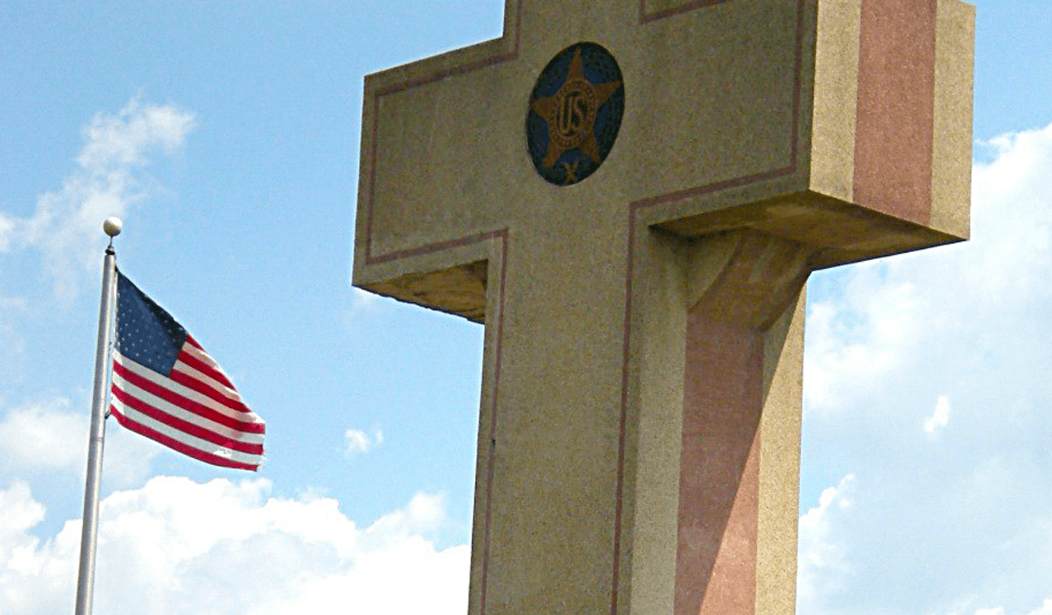On Thursday, the U.S. Supreme Court upheld the constitutionality of a cross-shaped World War I memorial. The atheist group American Humanist Association (AHA) had argued that the cross violated the Establishment Clause of the First Amendment, but the Court ruled (7-2) that the cross does not violate the Constitution.
“We conclude that the Bladensburg Cross does not violate the Establishment Clause,” Justice Samuel Alito wrote in the majority opinion for American Legion v. American Humanist Association (2019). The case centered on the Bladensburg Peace Cross, which was erected in 1925 as a monument to 49 soldiers from the area who gave their lives in World War I. A full 89 years after the cross’s dedication, AHA filed a lawsuit claiming that the presence of the memorial on public land and the use of public funds to erect it amounted to a government endorsement of Christianity.
Seven of the Court’s nine justices ruled that the cross has a secular purpose and does not amount to an establishment of religion.
“The Bladensburg Cross carries special significance in commemorating World War I,” Alito wrote. “Due in large part to the image of the simple wooden crosses that originally marked the graves of American soldiers killed in the war, the cross became a symbol of their sacrifice, and the design of the Bladensburg Cross must be understood in light of that background.”
“That the cross originated as a Christian symbol and retains that meaning in many contexts does not change the fact that the symbol took on an added secular meaning when used in World War I memorials,” he added. “Not only did the Bladensburg Cross begin with this meaning, but with the passage of time, it has acquired historical importance. It reminds the people of Bladensburg and surrounding areas of the deeds of their predecessors and of the sacrifices they made in a war fought in the name of democracy.”
Furthermore, Alito argued that the cross could not serve its role “if its design had deliberately disrespected area soldiers who perished in World War I. More than 3,500 Jewish soldiers gave their lives for the United States in that conflict, and some have wondered whether the names of any Jewish soldiers from the area were deliberately left off the list on the memorial or whether the names of any Jewish soldiers were included on the Cross against the wishes of their families. There is no evidence that either thing was done, and we do know that one of the local American Legion leaders responsible for the Cross’s construction was a Jewish veteran.”
While seven of the justices reached the conclusion that the cross did not violate the Constitution, different justices adopted different legal reasons to uphold the monument.
Chief Justice John Roberts, along with Justices Stephen Breyer, Elena Kagan, and Brett Kavanaugh joined Alito’s opinion, and Roberts, Breyer, and Kavanaugh joined another concurring opinion. Breyer wrote yet another concurring opinion, in which Kagan joined. Kavanaugh, Kagan, Clarence Thomas, and Neil Gorsuch wrote separate concurring opinions, with Thomas also joining Gorsuch. Only Justice Ruth Bader Ginsburg filed a dissent, which Sonia Sotomayor joined.
“This is a landmark victory for religious freedom,” Kelly Shackelford, president, CEO, and chief counsel at First Liberty, which represented the American Legion in defending the cross, said in a statement. “The days of illegitimately weaponizing the Establishment Clause and attacking religious symbols in public are over.”
“Our Founders would have been appalled at this attempt to make the government hostile to our religious heritage, history, and symbols,” Shackelford added. “The attempted perversion of our Constitution is now over, and every American now has more freedom than they have had in decades, with a government no longer hostile to people or expressions of faith.”
“The American Legion is proud to have defended the Bladensburg WWI Veterans Memorial,” Brett Reistad, national commander of The American Legion, said in a statement. “Since our founding, the Legion has been committed to defending the memorials of our fallen comrades because we know the price of freedom. To my fellow veterans: mission accomplished!”
First Liberty praised the Court’s ruling, arguing that it substantially alters the “Lemon test,” a subjective way to determine whether something violates the Establishment Clause established in the 1971 case Lemon v. Kurtzman. “In its place, the Court returned to a commonsense reading of the Establishment Clause that guards against the establishment of an official religion, while permitting the public acknowledgment of religion in public.”
“Bladensburg’s ‘Peace Cross’ honors veterans who gave everything to serve their country, and the Supreme Court’s decision means that the memorial will continue to honor their memory,” David Cortman, senior counsel and vice president of U.S. litigation at Alliance Defending Freedom (ADF), which filed a friend of the court brief in the case, said in a statement. “We commend the court for ensuring that one group’s offended feelings over the memorial won’t diminish the sacrifices of our veterans or dismantle their memory.”
“A passive monument like the Bladensburg Cross, which celebrates those who died to defend our Constitution and acknowledges our nation’s religious heritage, simply does not amount to an establishment of religion,” Cortman added.
Follow Tyler O’Neil, the author of this article, on Twitter at @Tyler2ONeil.









Join the conversation as a VIP Member